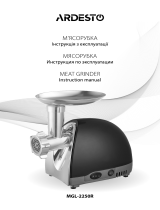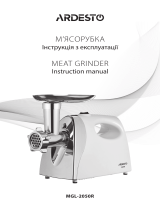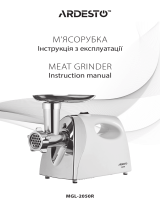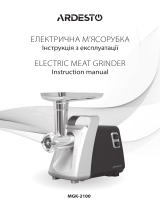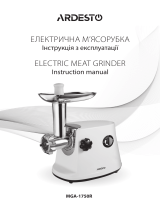
EN
17
Mincer
1. Insert the worm shaft into the cutter housing, the plastic end rst.
Place the cutter unit onto the worm shaft (the cutting edges should be at the
front). Place the medium grinding disc or coarse grinding disc (depending on the
consistency you prefer) onto the worm shaft. Make sure the notch of the grinding
disc t onto the projections of the mincer head. Turn the screw ring in the direction
of the arrow on the cutter housing until it is properly fastened.
2. Attach the cutter housing to the motor unit.
3. Place the tray on the upright part of the cutter housing.
4. Now the appliance is ready for mincing.
Cut the meat into 10cm-long, 2cm-thick strips. Remove bones, pieces of gristle and
sinews as much as possible. Never use frozen meat!
Put the meat in the tray. Use the pusher to gently push the meat into the cutter
hosing. For steak tartare, mince the meat with the medium grinding disc twice.
Making kebbe
1. Insert the worm shaft into the cutter
housing, the plastic end rst (g.8).
Place the cone in the cutter housing.
Place the former on the cutter housing
and screw the ring on the cutter
housing (g.9).
2. Attach the cutter housing to the motor
unit.
3. Place the tray on the upright part of
the cutter housing.
4. Now the appliance is ready for making
kebbe (g.10).
Feed the prepared kebbe mixture
through the kebbe maker. Cut the
continuous hollow cylinder into the
desired lengths and user as required.
Kebbe is a traditional Middle Eastern dish
made primarily of lamp and bulgur wheat
which are minced together to form a
paste the mixture is extruded through
the kebbe maker and cut into short
lengths. The tubes can then be stued
with a minced meat mixture, the ends
pinched together and then deep fried.





















